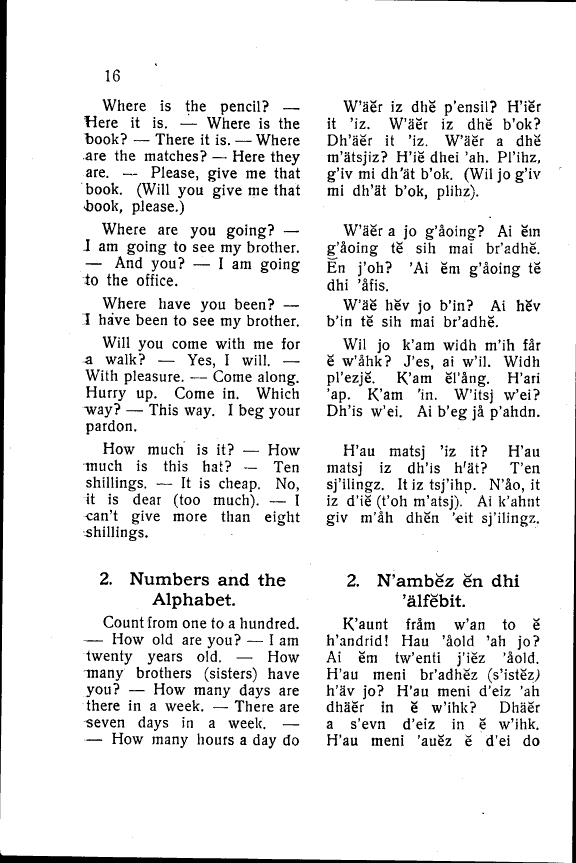
Full resolution (TIFF) - On this page / på denna sida - Läsestycken - 1. Everyday Phrases - 2. Numbers and Alphabet

<< prev. page << föreg. sida << >> nästa sida >> next page >>
Below is the raw OCR text
from the above scanned image.
Do you see an error? Proofread the page now!
Här nedan syns maskintolkade texten från faksimilbilden ovan.
Ser du något fel? Korrekturläs sidan nu!
This page has never been proofread. / Denna sida har aldrig korrekturlästs.
16
Where is the pencil? —
Here it is. — Where is the
book? — There it is. —Where
are the matches? — Here they
are. — Please, give me that
book. (Will you give me that
book, please.)
Where are you going? —
J am going to see my brother.
— And you? — I am going
to the office.
Where have you been? —
I have been to see my brother.
Will you come with me for
a walk? — Yes, I will. —
With pleasure. — Come along.
Hurry up. Come in. Which
way? — This way. I beg your
pardon.
How much is it? — How
much is this hat? — Ten
shillings. — It is cheap. No,
it is dear (too much). — I
can’t give more than eight
shillings.
W’äer iz dhĕ p’ensil? H’iĕr
it ’iz. W’äer iz dhĕ b’ok?
Dh’äĕr it ’iz. W’äer a dhĕ
m’ätsjiz? H’iĕ dhei ’ah. Pl’ihz,
g’iv mi dh’ät b’ok. (Wil jo g’iv
mi dh’ät b’ok, plihz).
W’äer a jo g’åoing? Ai em
g’åoing tĕ sih mai br’adhĕ.
En j’oh? ’Ai em g’åoing tĕ
dhi ’åfis.
W’äĕ hĕv jo b’in? Ai hĕv
b’in té sih mai br’adhĕ.
Wil jo k’am widh m’ih får
ĕ w’åhk? J’es, ai w’il. Widh
pl’ezjĕ. K’am ĕl’ång. H’ari
’ap. K’am ’in. W’itsj w’ei?
Dh’is w’ei. Ai b’eg jå p’ahdn.
H’au matsj ’iz it? H’au
matsj iz dh’is h’ät? T’en
sj’ilingz. It iz tsj’ihp. N’åo, it
iz d’iĕ (t’oh m’atsj). Ai k’ahnt
giv m’åh dhĕn ’eit sj’ilingz.
2. Numbers and the
Alphabet.
Count from one to a hundred.
— How old are you? — I am
twenty years old. — How
many brothers (sisters) have
you? — How many days are
there in a week. — There are
seven days in a week. —
— How many hours a day do
2. N’ambĕz en dhi
’älfĕbit.
K’aunt fråm w’an to ĕ
h’andrid! Hau ’åold ’ah jo?
Ai em tw’enti j’iĕz ’åold.
H’au meni br’adhĕz (s’istĕz)
h’äv jo? H’au meni d’eiz ’ah
dhäĕr in ĕ w’ihk? Dhäĕr
a s’evn d’eiz in ĕ w’ihk.
H’au meni ’auĕz ĕ d’ei do
<< prev. page << föreg. sida << >> nästa sida >> next page >>